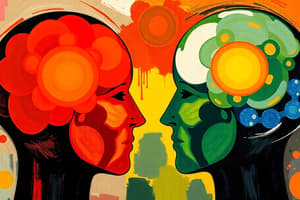Podcast
Questions and Answers
What is the definition of Psychology?
What is the definition of Psychology?
- The scientific study of behavior and mental processes. (correct)
- Mutual relation of two or more things.
- A testable prediction about behavior.
- A general principle or set of principles proposed to explain facts.
What is a Theory?
What is a Theory?
A general principle or set of principles proposed to explain how a number of separate facts are related.
What is a Hypothesis?
What is a Hypothesis?
A testable prediction about the conditions under which a particular behavior or mental process may occur.
What is the Independent Variable?
What is the Independent Variable?
What is the Dependent Variable?
What is the Dependent Variable?
What does Correlation mean?
What does Correlation mean?
What does the SQ3R Method stand for?
What does the SQ3R Method stand for?
What are the steps in The Scientific Method?
What are the steps in The Scientific Method?
Who is considered the Father of Psychology?
Who is considered the Father of Psychology?
What does Cognitive Psychology focus on?
What does Cognitive Psychology focus on?
What does Evolutionary Psychology study?
What does Evolutionary Psychology study?
What does the APA code of Ethics do?
What does the APA code of Ethics do?
What is Psychoanalysis?
What is Psychoanalysis?
Who are the early humanists in psychology?
Who are the early humanists in psychology?
What does Biological Psychology examine?
What does Biological Psychology examine?
What is the Sociocultural Approach?
What is the Sociocultural Approach?
What is the focus of Humanistic Psychology?
What is the focus of Humanistic Psychology?
Flashcards are hidden until you start studying
Study Notes
Key Concepts in Psychology
- Psychology: Scientific study of behavior and mental processes.
- Theory: A principle that explains how separate facts are related.
- Hypothesis: A testable prediction regarding behavior or mental processes.
Experimental Terminology
- Independent Variable: Factor manipulated in experiments to assess its impact on another variable.
- Dependent Variable: Measured factor presumed to change as a result of the independent variable's manipulation.
- Correlation: Mutual relationship between two or more elements.
The Scientific Method
- Step 1: Observe and theorize about phenomena.
- Step 2: Formulate a hypothesis based on observations.
- Step 3: Design a study for testing hypotheses.
- Step 4: Collect data to evaluate hypotheses.
- Step 5: Analyze and apply results to the hypothesis.
Study Techniques
- SQ3R Method: A study strategy that includes Survey, Question, Read, Recite, and Review; promotes efficient study and time management, enhancing control over learning.
Historical Perspectives
- Wilhelm Wundt: The Father of Psychology, introduced introspection as a method for exploration of conscious experience.
- Cognitive Psychology: Views humans as active participants in their environment, focuses on mental processes, and is influenced by Gestalt and information-processing psychology.
Psychological Approaches
- Evolutionary Psychology: Studies behavioral adaptations to environmental pressures, rooted in Darwin's natural selection theory.
- Biological Psychology: Investigates links between specific behaviors and biological processes, often within neuroscience.
- Sociocultural Approach: Highlights the impact of social and cultural contexts on behavior, emphasizing a systems perspective.
Ethical Guidelines
- APA Code of Ethics: Ensures the protection of human and animal rights in research, promotes scientific inquiry, mandates compliance with laws, and requires supervision of animal care.
Theoretical Frameworks
- Psychoanalysis: Freud's theory emphasizing unconscious influences on thoughts and behaviors, with Neo-Freudians developing alternative theories.
- Humanistic Psychology: Emphasizes human uniqueness, capacity for growth, and individual choice, associated with early theorists like Abraham Maslow and Carl Rogers.
Studying That Suits You
Use AI to generate personalized quizzes and flashcards to suit your learning preferences.




